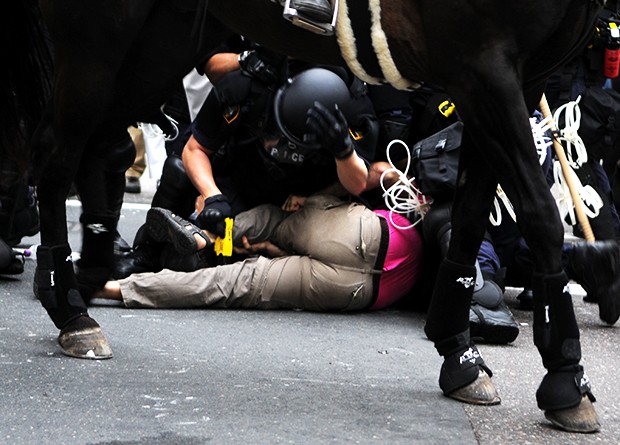Plaintiffs who say theyâÄôve been beaten, violated and robbed of their rights filed civil suits in federal court late last week, alleging significant misconduct during the Republican National Convention and seeking nearly $2 million in damages. The suits, the first major action since the September convention, request damages ranging from $100,000 to $1 million, and name Ramsey County and its sheriffâÄôs department, St. Paul and its police and Minneapolis and its police as defendants. For example, a University of Minnesota employee alleges that she was singled out by law enforcement officers and strip-searched in front of men. Others claim unlawful suppression of both individuals and independent media. Attorney Ted Dooley, who is representing seven of the plaintiffs who filed the cases, said heâÄôs optimistic about his clientsâÄô chances either in out-of-court settlements or before juries, should any of the cases make it to trial.

âÄúThe specifics in the cases vary as youâÄôd expect, but the underlying harm is either the willful or blatantly ignorant attack of the people who were there to express political dissent,âÄù he said. âÄúThere was an utter disregard for the right to do that.âÄù As a condition of hosting the RNC, the city of St. Paul requested the convention host committee pay the $1.1 million premium on a $10 million insurance policy that would cover suits stemming from RNC-related police action. St. Paul City Attorney John Choi said the city has forwarded the lawsuits to the insurance company providing the policy. âÄúI expect that the insurance policy would cover the other defendants,âÄù he said. The insurance company will hire outside counsel to handle the defense of the defendants named in the suits. Minneapolis spokesman Matt Laible said the city attorneyâÄôs office has not yet seen the suits against Minneapolis and also said it is policy not to comment on pending litigation. The much-scrutinized Ramsey County SheriffâÄôs Department and St. Paul Police Department did not respond to requests for comment.
‘I think it was meant to degrade me’
Michelle Gross, president of the civil rights group Communities United Against Police Brutality, also works as manager of staff training and development for University of Minnesota Physicians. In her $250,000 suit, she alleges Ramsey County SheriffâÄôs deputies strip-searched her, and only her, in the presence of men during the Aug. 29 raid of a meeting space used by protesters. Gross said she was compliant with the deputy, but believes she was targeted because she was wearing an anti-police brutality T-shirt and videotaping the raid. She says the officer touched under her bra and around the top of her underwear while she was being merely detained, not arrested. âÄúI felt pretty weird about it at the time, but there was so much other weirdness going on,âÄù Gross said. âÄúThe whole thing was surreal, it was just bizarre.âÄù The rented house that was raided was used only as a central point for protesters to meet and talk âÄî First Amendment-protected activities, Gross said. In addition to the monetary damages sheâÄôs seeking, Gross also said she hopes her suit forces policy changes. âÄúI want them to not do this to anybody else,âÄù she said. âÄúI think it was a power move and I think was meant to degrade me.âÄù
‘This series of attacks on free speechâĦ’
Protester Jason Johnson of Oakland, Calif., filed a $1 million suit against the cities of St. Paul and Minneapolis, and more than a dozen officers from the two departments. Officers at a protest in Mears Park on Sept. 2, the second day of the convention, plucked Johnson from a crowd of protesters and used a Taser on him. Afterward, according to the suit, Johnson raised his hands and offered no resistance. Police continued to repeatedly use the Taser on Johnson. The suit states Johnson required medical attention for seven separate Taser wounds and was bloodied during âÄúthe battery.âÄù He also reportedly suffered âÄúsevere emotional distressâÄù and requires âÄúcontinuing medical care for the trauma of the unlawful tasering .âÄù Johnson said the police action was unprovoked. âÄúAt all times relevant to this lawsuit, [he] acted peaceably and in a law-abiding fashion before he was tasered,âÄù the suit reads. Though the incident in question happened in downtown St. Paul, the city of Minneapolis is also named in the suit because some officers from its police department were involved.
‘âĦand particularly on our freedom of the press’
Wendy Binion of Portland, Ore., came to the RNC as a journalist for Portland Indymedia. She filed a $100,000 suit against the city of St. Paul and more than a dozen St. Paul police officers who took her into custody during the same Mears Park protest where police used a Taser on Johnson. She was one of the first people arrested at the start of an evening that would hours later culminate in police using tear gas, concussion grenades and âÄúless-lethalâÄù projectiles. The diminutive Binion questioned the force of multiple riot gear-clad police that handled her. Police also seized the camera she was using to videotape the demonstration and other personal effects.

She was initially charged with a riot-related felony, but that was dismissed. She faces no charges now, but she said sheâÄôs heard sheâÄôs under investigation for criminal conspiracy to commit riot, a probe that could be open for several years. Binion said she was peacefully carrying out her duties as a journalist, but was targeted because she is part of the independent media. Police took her camera and by the time she got it back, Binion said, it was damaged. âÄúThey were taking away peopleâÄôs right to document their own history,âÄù she said. Attorney Dooley said the police force at the RNC, made up of more than 100 different law enforcement entities that signed joint-powers agreements, âÄúcoordinated this series of attacks on free speech and particularly freedom of the press.âÄù âÄîKarlee Weinmann is a senior staff reporter.








